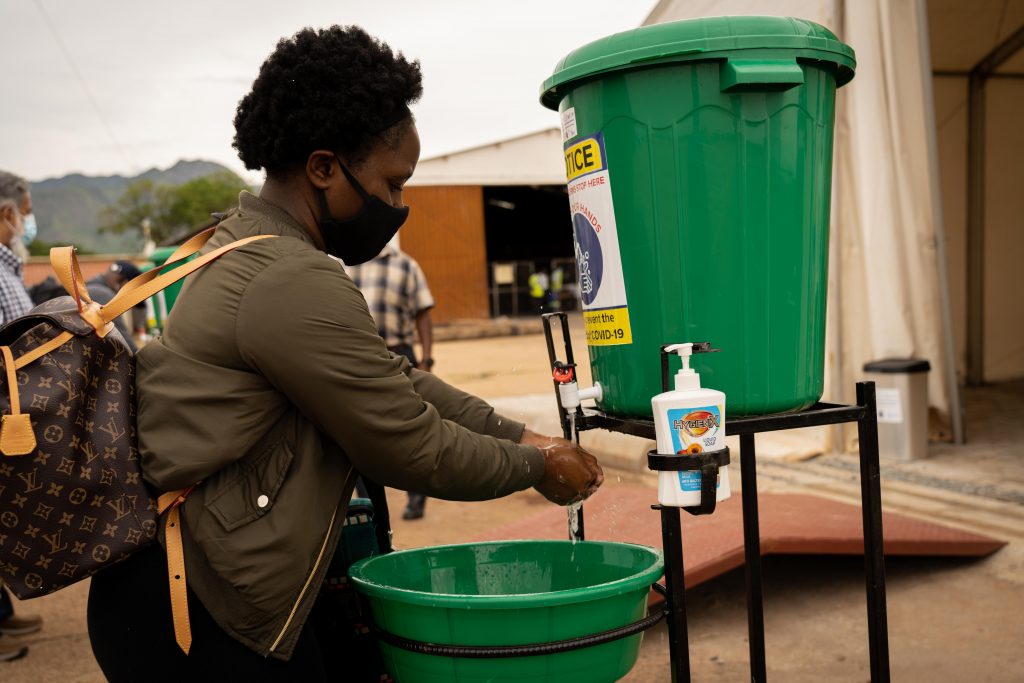Covid ups sanitation drive
It is a Thursday afternoon and Esnat Paloti is waiting for a turn at the borehole in Malunga Village in Senior Chief Chikowi’s area in Zomba.
Unlike what you see in many villages, there is no swamp around the borehole.

Here you find a hand pump surrounded by well-tended ridges draped with sweet potatoes. The water running off from the borehole drains into a covered pit.
The sight has not always been this way. In the past, Paloti says, the area surrounding the water source had untended grass growing from a stinking swamp. It was a breeding ground for mosquitoes.
“Mosquitoes were rampant and malaria cases were persistent. Water-borne diseases were common. Once, my first-born son, aged 19, was hospitalised at Lambulira Health Centre for three days. We don’t know what was going on until the medical personnel told us it was dysentery,” she explains.
According to Paloti, clearing the bushes and stagnant pools has destroyed mosquitoes’ breeding ground, reducing cases of malaria.
“And, when we draw water, we add in chlorine right there at the borehole. We are no longer taking chances in keeping water safe,” she adds.
In the nearby Mbembecha Village, Ista Zimba, a mother of six, taunts neighbours who do not have latrines with mocking messages on the walls of her pit latrine.
Neba, kumba chako, reads the writing on the wall—daring the neighbour to dig their own latrine.
The 50-year-old smallscale farmer learned a bitter lesson of unhygienic practices a year ago when one of her children was hospitalised at Sadzi Health Centre in Zomba.
“I thought my son was going to die of dysentery. It was all because flies were roaming freely from the uncovered pit latrine to our food. Since then, I have learned to cover the pit latrine,” she says.
Paloti and Zimba may be lucky, if statistics from WaterAid is anything to go by. The international water, sanitation and hygiene non-governmental orgnisation states that a third of Malawi’s population—about 5.6 million people—do not have clean water.
As a result, 3 100 under-five children die every year from diarrhoea caused by dirty water and poor sanitation.
Further, it states that 9.6 million people do not have decent toilets while 73 percent of health care facilities do not have access to a sanitation facility.
Lambulira Health Centre, where Paloti’s child was treated, is one of these facilities.
According to clinician-in-charge Hezekiah Mwale, the health facility serves about 37 000 people in surrounding villages.
“The health centre was in the middle of unkempt bushes, the toilets were a no-go zone, there was no pit latrine in sight and the placenta incinerator was not functional,” he says.
The consequences of the breakdown in water, sanitation and hygiene services in the villages overwhelmed the unsanitary health centre.
The clinician asssists long queues in search for treatment for waterborne and sanitation-related diseases such as diarrhoea and dysentery. The pressure has eased due to change in attitudes in the villages and the health centre.
But the situation has improved tremendously.
Mwale says: “We have improved our hygiene and sanitation at the health centre. The grounds are clean, the toilets smart and we removed all the cobwebs that were part of life.
“It is clear that villagers heeded word from some civil society organisations as much as we changed our ways. Previously, in every 15 patients we were attending to, seven had diarrhoea or skin diseases. From treating 300 people a day, we now only have 75.”
With Covid-19, the facility has even extended its Wash activities. There are more hand-washing spots, no one is allowed at the centre without a face mask and social distance is a must.
“The beds in the labour ward are set two metres apart. We are not taking any chances,” says Mwale.
Coincidentally, the Advanced Development Communications and Training Services (Adecots) has engaged musicians and artists as social influencers spreading Wash messages in addition to others on nutrition, malaria, reproductive health and maternal and neo-natal health.
Under the Moyo ndi Mpamba banner, the project is supported by the health education services under the Ministry of Health with funding from the United States Development Agency (USaid) through the FHI 360’s Health Communication for Life (HC4L).
Adecots executive director Mercy Simbi agrees spreading Wash messages must be increased in the face of Covid-19.
“Covid-19 has reminded us the importance of proper sanitation and hygiene. Things like hand-washing, which we took lightly have taken new meaning. The artists are encouraging their followers on how to take care of water, for instance by boiling water from the borehole,” she said.
According to Simbi, the messages are cross-cutting, since for mothers with new-born babies, it is critical to wash their hands with soap after changing diapers.




